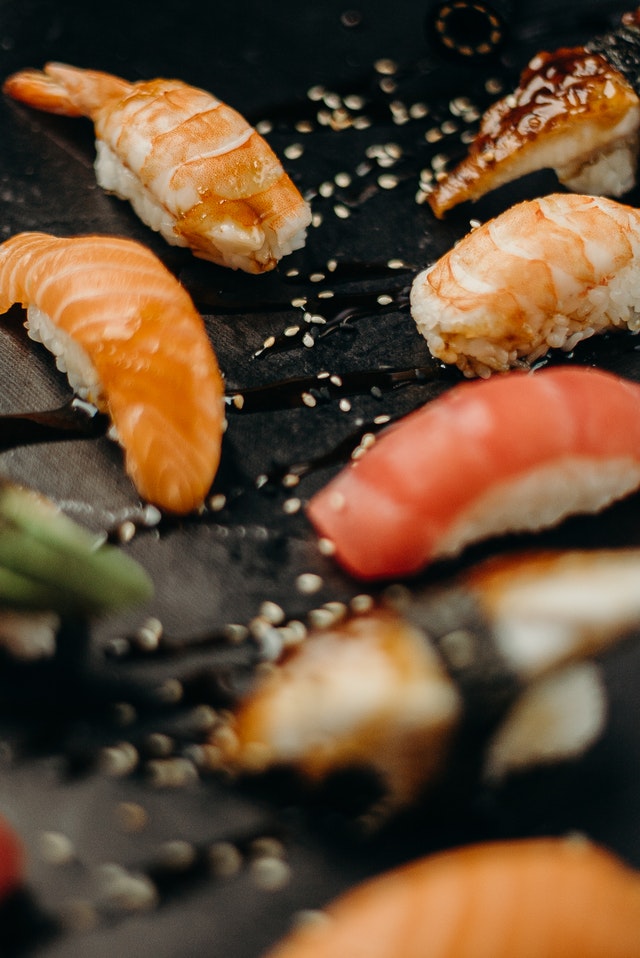What Foods Should I Avoid During Pregnancy?

A lot of things change in your life when you get pregnant, including understanding a long list of foods you’re supposed to avoid. To best protect you and your baby, it’s important to know which foods could cause food-borne illnesses.
By Halle Tecco, MBA, MPH
A lot of things change in your life when you get pregnant, including understanding a long list of foods you’re supposed to avoid. To best protect you and your baby, it’s important to know which foods could cause food-borne illnesses. This includes those items more likely to be harborers of harmful bacteria, such as E. coli, Toxoplasma gondii (which causes toxoplasmosis), Salmonella, and Listeria. We also look out for foods (mostly fish) with higher levels of mercury, which has been linked to birth defects.
It’s a lot to remember, so we created this clear and simple guide to give you the scoop on which foods to avoid and why.
Seafood: avoid raw sushi, shellfish, and fish with high mercury levels
We suggest following the FDA and EPA’s advice to eat two to three servings of fish a week (eight to 12 ounces in total) of “best choice” fish. We also agree with their recommendation of consuming only one serving a week (no more than six ounces) of “good choice” fish with some mercury concentrations, such as canned tuna, bluefish, halibut, and monkfish.
You should avoid fish with the highest mercury concentrations. This includes king mackerel, marlin, orange roughy, shark, swordfish, tilefish (from Gulf of Mexico), and bigeye tuna. You should also avoid raw or undercooked sushi and shellfish. We recommend following the EPA and FDA advice on eating fish and shellfish.
Caffeine: keep it to less than 200 mg per day
We know pregnant women metabolize caffeine much more slowly than non-pregnant women. It can take up to three and a half times longer for a pregnant woman to eliminate caffeine from her body. Caffeine is also known to cross the placenta and enter the baby’s bloodstream, which of course raises concerns. ACOG rounded up and reviewed all the literature out there and came to the conclusion that moderate caffeine consumption doesn’t seem to be a contributing factor in terms of miscarriage or preterm labor. Just keep it to under 200 mg (read more on caffeine intake during pregnancy from Dr. Mare).
Dairy: avoid unpasteurized milk (and products made from it)
Pregnant women are ten times more likely than other people to get listeriosis (a serious infection caused by eating food contaminated with bacteria called Listeria).
To avoid listeriosis, the CDC recommends avoiding raw (unpasteurized) milk and products made from it, such as cheese, ice cream, and yogurt. This means avoiding cheese made from raw (unpasteurized) milk. Look for the word “pasteurized” on the label. When in doubt, don’t eat it!
Eggs: avoid raw or undercooked eggs
Raw eggs can be contaminated with harmful bacteria, such as Salmonella. Avoid foods made with raw or partially cooked eggs. That means no raw cookie dough (sorry!), cake icing, poached eggs, hollandaise sauce, or eggnog.
Deli meats and hot dogs: no, unless they are piping hot
The CDC also recommends avoiding hot dogs, lunch meats, cold cuts, other deli meats (such as bologna), and fermented or dry sausages, unless they are heated to an internal temperature of 165°F or until steaming hot just before serving. And remember—don’t let juice from hot dog and lunch meat packages get on other foods, utensils, or food preparation surfaces.
Other meat: no raw or cured meats
Definitely avoid raw or undercooked meat, which can be contaminated with toxoplasmosis or Salmonella (which could harm you and the baby). Cured meats, pates, and meat spreads are also a no-no because they may contain parasites or the bacteria listeria. Wash your hands thoroughly as well as clean surfaces and utensils after handling any raw meat during cooking or food preparation.
If you have any questions about nutrition during pregnancy, check out foodsafety.gov or the CDC, and of course, be sure to talk with your OBGYN.
Reach Out, We're Here
Have questions about your order or products? For the speediest answer, check out our FAQ section. Need something else? Come find us below.
Please keep in mind our regular business hours; Monday-Friday, 9am-5pm CT.
Customer Support
support@natalist.com
Press Inquiries
media@everlyhealth.com
Business & Partnerships
team@natalist.com
Affiliates + Influencers
team@natalist.com
Job Openings
Careers Page























